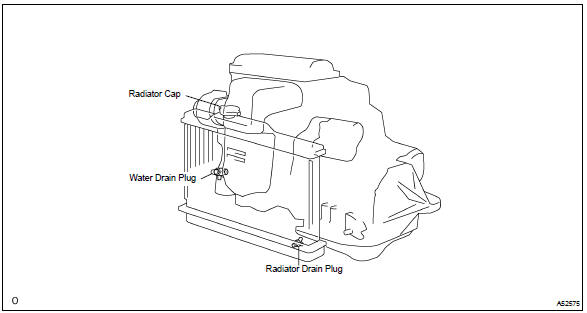 Toyota Camry XV30 (2002–2006) Service ManualCooling
Toyota Camry XV30 (2002–2006) Service ManualCooling
Coolant (2AZ−FE)(From July, 2003)
Coolant (2AZ−FE)(From July, 2003)
REPLACEMENT
1. DRAIN ENGINE COOLANT
a. Remove the radiator cap.
CAUTION: Do not remove the radiator cap while the engine and radiator are still hot. Pressurized, hot engine coolant and steam may be released and cause serious burns.
b. Drain engine coolant by loosening the radiator drain plug and the engine’s water drain plug.
HINT: Engine coolant inside the radiator is drained from the drain hole located on the bottom of the engine under cover.
c. Tighten the cylinder block drain cock plugs.
Torque: 13 N·m (130 kgf·cm, 10 ft·lbf)
 Drain engine coolant
Drain engine coolant
2. ADD ENGINE COOLANT
-
Tighten the radiator drain plug.
-
Add engine coolant into the radiator until it overflows.
Capacity: 6.2 liters (6.6 US qts, 5.4 lmp. qts)
HINT:
-
Use of improper coolants may damage the engine cooling system.
-
Use ”Toyota Super Long Life Coolant” or similar high quality ethylene glycol based non−silicate, non− amine, non−nitrite, and non−borate coolant with long−life hybrid organic acid technology.
-
New Toyota vehicles are filled with Toyota Super Long Life Coolant (color is pink, premixed ethylene− glycol concentration is approximately 50% and freezing temperature is −35 C (−31 F)). When replacing the coolant, Toyota Super Long Life Coolant is recommended.
-
Observe the coolant level inside the radiator by pressing the inlet and outlet radiator hoses several times by hand. If the coolant level goes down, add the coolant.
NOTICE: Do not use plain water alone.
Pour coolant into the radiator reservoir tank until the coolant reaches the full line.
-
Install the radiator cap.
-
Start the engine and run the engine for 10 seconds.
-
Remove the radiator cap after 10 seconds. Pour coolant if the coolant level is lower.
-
Repeat d. to f. until the coolant level remains the same from steps d. to f..
HINT: Perform the procedures above before the engine warms up. A warmed up engine causes the thermostat valve to open, and the air inside of the engine circulates between the radiator and the engine.
-
Install the radiator cap.
-
Warm up the engine until the thermostat valve begins to open.
HINT: As the engine warms up, press the radiator inlet and outlet hose several times by hand.
-
Stop the engine and wait until the coolant cools down to room temperature. If the coolant is below the full line, add coolant.
-
Install the radiator cap and check the radiator reservoir tank coolant level. If it is below the full line, add coolant.
3. CHECK FOR ENGINE COOLANT LEAKS
-
Fill the radiator with coolant and attach a radiator cap tester.
-
Pump it to 118 kPa (1.2 kgf/cm2, 17.1 psi) and check leakage.
Cooling system (2AZ−FE)(From July, 2003)
Water pump assy (2AZ−FE)(From July, 2003)
Thermostat (2AZ−FE)(From July, 2003)
Radiator assy (2AZ−FE)(From July, 2003)
Cooling system (2AZ−FE)(From July, 2003)
Cooling system (1MZ−FE/3MZ−FE)
Cooling fan system (1MZ−FE/3MZ−FE)
Coolant (1MZ−FE/3MZ−FE)
Water pump assy (1MZ−FE/3MZ−FE)
Thermostat (1MZ−FE/3MZ−FE)
Radiator assy (1MZ−FE/3MZ−FE)
Cooling fan system (2AZ−FE)(From July, 2003)
Coolant (2AZ−FE)(From July, 2003)
Water pump assy (2AZ−FE)(From July, 2003)
Toyota Camry XV30 (2002–2006) Service Manual
- Introduction
- Audio & visual system
- Automatic transmission / trans
- Brake
- Clutch
- Communication system
- Cooling
- Cruise control
- Drive shaft / propeller shaft
- Emission control
- Engine control system
- Engine hood/door
- Engine mechanical
- Exhaust
- Exterior/interior trim
- Front suspension
- Fuel
- Heater & air conditioner
- Ignition
- Instrument panel/meter
- Intake
- Lighting
- Lubrication
- Manual transmission/transaxle
- Parking brake
- Power steering
- Rear suspension
- Seat
- Service specifications
- Sliding roof/convertible
- Starting & charging
- Steering column
- Supplemental restraint system
- Theft deterrent & door lock
- Tire & wheel
- Windshield/windowglass/mirror
- Wiper & washer
- Wiring
